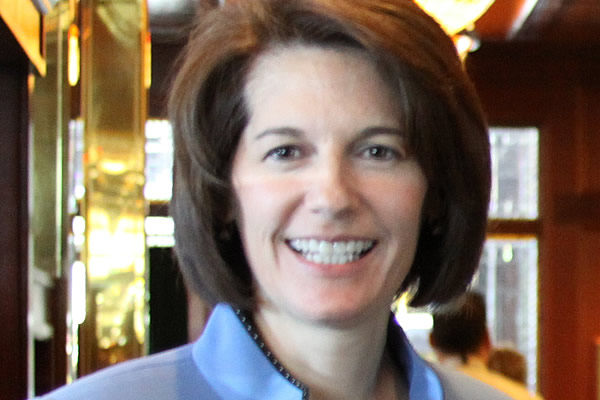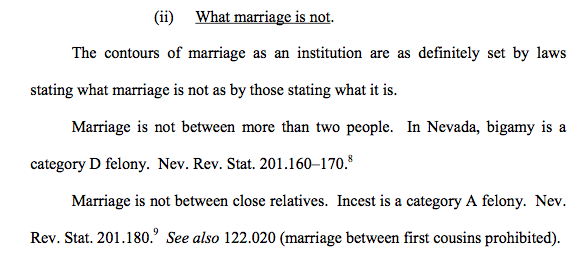News
Nevada AG invokes bigamy, incest to defend marriage ban
State interest is ‘to protect and perpetuate traditional marriage’

Ask the attorney general of Nevada about the definition of marriage, and she’ll tell you it doesn’t include the union of a same-sex couple. But in the same breath, she’ll tell you it also doesn’t include incest or bigamy either.
In a 55-page brief filed on Tuesday, Nevada Attorney General Catherine Cortez Masto urges the U.S. Ninth Circuit Court of Appeals to uphold the state’s constitutional ban on same-sex marriage on the basis that it reflects the will of the people.
“The interest of the State in defining marriage in this manner is motivated by the state’s desire to protect and perpetuate traditional marriage,” Masto writes. “In establishing this criterion and others — e.g., age, consanguinity, unmarried status, etc. — the state exercises its prerogative as a State, and that exercise is entitled to respect.”
But in a section titled “Marriage Defined” explaining “what marriage is” and “what marriage is not,” Masto reminds the court that in addition to not being for same-sex couples under Nevada law, marriage is also not for those engaging in bigamy or incest.
The invocation of bigamy and incest in Nevada’s brief before the Ninth Circuit recalls the first legal brief the Obama administration filed in support of the Defense of Marriage Act when it was still defending the law in court. That brief invoked bigamy and pedophilia to assert the constitutionality of the ban on federal recognition of same-sex marriage, which riled LGBT advocates.
Evan Wolfson, president of Freedom to Marry, took Masto to task for making an implicit comparison between same-sex marriage and bigamy or incest while saying she makes no solid argument against allowing gay nuptials in Nevada.
“Marriage is not ‘defined’ by who is denied it, and nothing in the brief explains why loving and committed couples of the same sex should be denied the legal commitment and bundle of obligations and protections that are available to different-sex couples,” Wolfson said. “To invoke bigamy and incest, as the attorney general does — at least she stopped short of bestiality! — doesn’t supply an explanation; it makes clear that the state has nothing to offer to justify the discrimination against same-sex couples in Nevada.
But Wolfson said he concurs with another argument within the attorney general’s brief: domestic partnerships, which are permitted under Nevada law, aren’t equivalent to and don’t provide a substitute for marriage.
The brief was filed in the case of Sevcik v. Sandoval, a challenge filed by Lambda Legal against Nevada’s ban on same-sex marriage in 2012.
Jon Davidson, Lambda’s legal director, said “of course, we find any such comparison objectionable” between same-sex marriage and bigamy or incest. The organization is slated to file its formal response to the attorney general’s brief next month.
Masto is a Democrat and has served in the role of attorney general for Nevada since 2007. Other Democrats holding the office in other states — most recently Virginia Attorney General Mark Herring — have elected not to defend marriage bans in the state on the basis that they’re unconstitutional.
Notably, Masto argues at length that the Ninth Circuit shouldn’t apply heightened scrutiny, or a greater assumption a law is unconstitutional, to the ban on same-sex marriage. That argument is somewhat dated after the Ninth Circuit on Tuesday applied heightened scrutiny in ruling that a juror cannot be excluded from a trial based on sexual orientation — a decision that will have precedent in the marriage case.
“Under an objective application of due process and equal protection analyses, there is no basis for heightened review of the State’s purpose in defining marriage by its traditional meaning,” Masto writes. “There exists neither fundamental right, nor suspect or quasi- suspect class, justifying a different standard of review.”
But the invocation of bigamy and incest isn’t the only part of the brief that is raising concerns among LGBT advocates.
Responding to the various friend-of-the-court briefs filed in the case on behalf of same-sex marriage, Masto takes issue with the way some say marriage is about children and others say it isn’t.
“There is some irony in the inconsistency in certain arguments made by amici,” Masto writes. “A brief by the Family Equality Council, et al., posits that the policy issue is primarily about children, presenting ‘testimonials from the children raised in such families [those with same-sex parents].’ In a separate brief, Family Law Professors (who are ‘scholars of family law’) argue that marriage is not about children.”
Masto concludes these divergent views on the role of children in marriage serve to “reinforce the conclusion that the state’s legislature is the democratic crucible where the issues should be debated and decided.”
Emily Hecht-McGowan, the Family Equality Council’s director of public policy, slammed the attorney general for her interpretation of its brief in favor of marriage equality.
“The Attorney General is missing the primary point of our Voices of Children brief, which is not that marriage is primarily about children but rather that the denial of marriage equality fundamentally harms children being raised by same-sex couples by rendering them and their families second-class citizens,” Hecht-McGowan said. “We trust that the Justices reading our brief and hearing oral arguments will reach the same conclusion that Justice Kennedy reached in his majority opinion in U.S. v. Windsor — that laws denying marriage recognition to same-sex couples ‘humiliate children’ and are a violation of equal protection under the law.”
District of Columbia
D.C. police arrest man for burglary at gay bar Spark Social House
Suspect ID’d from images captured by Spark Social House security cameras

D.C. police on Feb. 18 arrested a 63-year-old man “of no fixed address” for allegedly stealing cash from the registers at the gay bar Spark Social House after unlawfully entering the bar at 2009 14th St., N.W., around 12:04 a.m. after it had closed for business, according to a police incident report.
“Later that day officers canvassing for the suspect located him nearby,” a separate police statement says. “63-year-old Tony Jones of no fixed address was arrested and charged with Burglary II,” the statement says.
The police incident report states that the bar’s owner, Nick Tsusaki, told police investigators that the bar’s security cameras captured the image of a man who has frequently visited the bar and was believed to be homeless.
“Once inside, the defendant was observed via the establishment’s security cameras opening the cash register, removing U.S. currency, and placing the currency into the left front pocket of his jacket,” the report says.
Tsusaki told the Washington Blade that he and Spark’s employees have allowed Jones to enter the bar many times since it opened last year to use the bathroom in a gesture of compassion knowing he was homeless. Tsusaki said he is not aware of Jones ever having purchased anything during his visits.
According to Tsusaki, Spark closed for business at around 10:30 p.m. on the night of the incident at which time an employee did not properly lock the front entrance door. He said no employees or customers were present when the security cameras show Jones entering Spark through the front door around 12:04 a.m.
Tsusaki said the security camera images show Jones had been inside Spark for about three hours on the night of the burglary and show him taking cash out of two cash registers. He took a total of $300, Tsusaki said.
When Tsusaki and Spark employees arrived at the bar later in the day and discovered the cash was missing from the registers they immediately called police, Tsusaki told the Blade. Knowing that Jones often hung out along the 2000 block of 14th Street where Spark is located, Tsusaki said he went outside to look for him and saw him across the street and pointed Jones out to police, who then placed him under arrest.
A police arrest affidavit filed in court states that at the time they arrested him police found the stolen cash inside the pocket of the jacket Jones was wearing. It says after taking him into police custody officers found a powdered substance in a Ziploc bag also in Jones’s possession that tested positive for cocaine, resulting in him being charged with cocaine possession in addition to the burglary charge.
D.C. Superior Court records show a judge ordered Jones held in preventive detention at a Feb. 19 presentment hearing. The judge then scheduled a preliminary hearing for the case on Feb. 20, the outcome of which couldn’t immediately be obtained.
District of Columbia
Judge rescinds order against activist in Capital Pride lawsuit
Darren Pasha accused of stalking organization staff, board members, volunteers

A D.C. Superior Court judge on Feb.18 agreed to rescind his earlier ruling declaring local gay activist Darren Pasha in default for failing to attend a virtual court hearing regarding an anti-stalking lawsuit brought against him by the Capital Pride Alliance, the group that organizes D.C.’s annual Pride events.
The Capital Pride lawsuit, initially filed on Oct. 27, 2025, accuses Pasha of engaging in a year-long “course of conduct” of “harassment, intimidation, threats, manipulation, and coercive behavior” targeting Capital Pride staff, board members, and volunteers.
In his own court filings without retaining an attorney, Pasha has strongly denied the stalking related allegations against him, saying “no credible or admissible evidence has been provided” to show he engaged in any wrongdoing.
Judge Robert D. Okum nevertheless on Feb. 6 approved a temporary stay-away order requiring Pasha to stay at least 100 feet away from Capital Pride’s staff, volunteers, and board members until the time of a follow-up court hearing scheduled for April 17. He reduced the stay-away distance from 200 yards as requested by Capital Pride.
In his two-page order issued on Feb. 18, Okun stated that Pasha explained that he was involved in a scooter accident in which he was injured and his phone was damaged, preventing him from joining the Feb. 6 court hearing.
“Therefore, the court finds there is a good cause for vacating the default,” Okun states in his order.
At the time he initially approved the default order at the Feb. 6 hearing that Pasha didn’t attend, Okun scheduled an April 17 ex parte proof hearing in which Capital Pride could have requested a ruling in its favor seeking a permanent anti-stalking order against Pasha.
In his Feb. 18 ruling rescinding the default order Okun changed the April 17 ex parte proof hearing to an initial scheduling conference hearing in which a decision on the outcome of the case is not likely to happen.
In addition, he agreed to consider Pasha’s call for a jury trial and gave Capital Pride 14 days to contest that request. The Capital Pride lawsuit initially called for a non-jury trial by judge.
One request by Pasha that Okum denied was a call for him to order Capital Pride to stop its staff or volunteers from posting information about the lawsuit on social media. Pasha has said the D.C.-based online blog called DC Homos, which Pasha claims is operated by someone associated with Capital Pride, has been posting articles portraying him in a negative light and subjecting him to highly negative publicity.
“The defendant has not set forth a sufficient basis for the court to restrict the plaintiff’s social media postings, and the court therefore will deny the defendant’s request in his social media praecipe,” Okun states in his order.
A praecipe is a formal written document requesting action by a court.
Pasha called the order a positive development in his favor. He said he plans to file another motion with more information about what he calls the unfair and defamatory reports about him related to the lawsuit by DC Homos, with a call for the judge to reverse his decision not to order Capital Pride to stop social media postings about the lawsuit.
Pasha points to a video interview on the LGBTQ Team Rayceen broadcast, a link to which he sent to the Washington Blade, in which DC Homos operator Jose Romero acknowledged his association with Capital Pride Alliance.
Capital Pride Executive Director Ryan Bos didn’t immediately respond to a message from the Blade asking whether Romero was a volunteer or employee with Capital Pride.
Pasha also said he believes the latest order has the effect of rescinding the temporary stay away order against him approved by Okun in his earlier ruling, even though Okun makes no mention of the stay away order in his latest ruling. Capital Pride attorney Nick Harrison told the Blade the stay away order “remains in full force and effect.”
Harrison said Capital Pride has no further comment on the lawsuit.
District of Columbia
Trans activists arrested outside HHS headquarters in D.C.
Protesters demonstrated directive against gender-affirming care

Authorities on Tuesday arrested 24 activists outside the U.S. Department of Health and Human Services headquarters in D.C.
The Gender Liberation Movement, a national organization that uses direct action, media engagement, and policy advocacy to defend bodily autonomy and self-determination, organized the protest in which more than 50 activists participated. Organizers said the action was a response to changes in federal policy mandated by Executive Order 14187, titled “Protecting Children from Chemical and Surgical Mutilation.”
The order directs federal agencies and programs to work toward “significantly limiting youth access to gender-affirming care nationwide,” according to KFF, a nonpartisan, nonprofit organization that provides independent, fact-based information on national health issues. The executive order also includes claims about gender-affirming care and transgender youth that critics have described as misinformation.
Members of ACT UP NY and ACT UP Pittsburgh also participated in the demonstration, which took place on the final day of the public comment period for proposed federal rules that would restrict access to gender-affirming care.
Demonstrators blocked the building’s main entrance, holding a banner reading “HANDS OFF OUR ‘MONES,” while chanting, “HHS—RFK—TRANS YOUTH ARE NO DEBATE” and “NO HATE—NO FEAR—TRANS YOUTH ARE WELCOME HERE.”
“We want trans youth and their loving families to know that we see them, we cherish them, and we won’t let these attacks go on without a fight,” said GLM co-founder Raquel Willis. “We also want all Americans to understand that Trump, RFK, and their HHS won’t stop at trying to block care for trans youth — they’re coming for trans adults, for those who need treatment from insulin to SSRIs, and all those already failed by a broken health insurance system.”
“It is shameful and intentional that this administration is pitting communities against one another by weaponizing Medicaid funding to strip care from trans youth. This has nothing to do with protecting health and everything to do with political distraction,” added GLM co-founder Eliel Cruz. “They are targeting young people to deflect from their failure to deliver for working families across the country. Instead of restricting care, we should be expanding it. Healthcare is a human right, and it must be accessible to every person — without cost or exception.”

Despite HHS’s efforts to restrict gender-affirming care for trans youth, major medical associations — including the American Medical Association, the American Academy of Pediatrics, and the Endocrine Society — continue to regard such care as evidence-based treatment. Gender-affirming care can include psychotherapy, social support, and, when clinically appropriate, puberty blockers and hormone therapy.
The protest comes amid broader shifts in access to care nationwide.
NYU Langone Health recently announced it will stop providing transition-related medical care to minors and will no longer accept new patients into its Transgender Youth Health Program following President Donald Trump’s January 2025 executive order targeting trans healthcare.





















